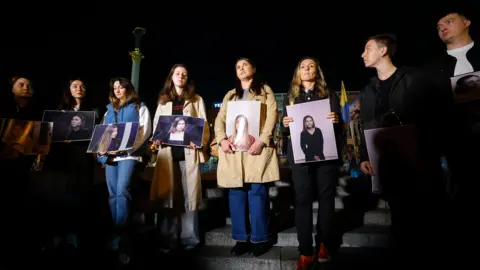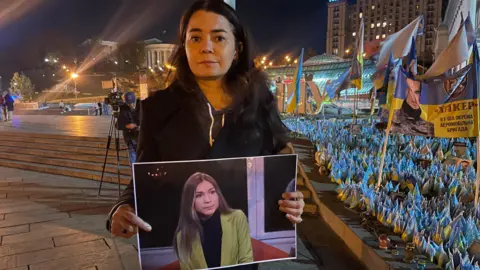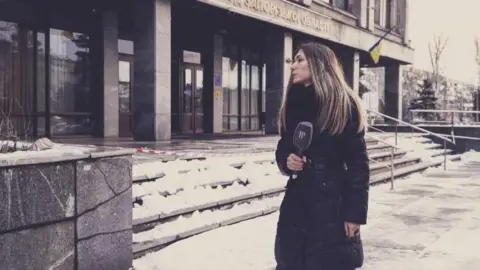Ukrainian journalist, 27, who chronicled Russian occupation dies in prison
Viktoriia Roshchyna disappeared in August 2023 in a part of Ukraine now occupied by Russian forces.
It took nine months for Russian authorities to confirmed the journalist had been detained. They gave no reason.
This week, her father got a terse letter from the defence ministry in Moscow informing him that Victoria was dead, aged 27.
The document said the journalist’s body would be returned in one of the swaps organised by Russia and Ukraine for soldiers killed on the battlefield. The death date was given as 19 September.
Again, there was no explanation.
Vigil for Viktoriia
This weekend, friends gathered to remember Viktoriia on the Maidan in central Kyiv. They shuffled into position on the steps holding her photograph, young face smiling out at the small crowd.
“She had huge courage,” one woman began the tributes.
“We will miss her enormously,” said another, turning away as her eyes filled with tears.
Viktoriia’s stories were snapshots of life that Ukrainians were not getting from anywhere else.
Reporting from occupied areas of Ukraine was extremely dangerous, but her colleagues remember how she was desperate to go there, even after she was detained and held in custody the first time, for ten days.

“Her parents used to call and tell us to stop deploying her, but we never did deploy her!” one of her former bosses recalled.
“All her editors tried to stop her. But it was impossible.”
The young reporter eventually went freelance in order to deploy herself and when she got back newspapers would buy her reports.
Most strikingly, she never used a pseudonym even though she wrote openly of “occupied” territory and referred to those who collaborated with the Russians as “traitors”.
“She wanted to provide information about how those cities live under siege by the Russian army,” Sevgil Musaieva, editor-in-chief at Ukrayinska Pravda, told the BBC.
“She was absolutely amazing.”
Detention
Viktoriia’s father has previously described how she set out via Poland and Russia last July, heading for occupied Ukraine.
It was a week before she called to say she’d been interrogated at the border for several days.
All we know for sure after that, is that by May she was in Detention Centre No. 2 in Taganrog, southern Russia – a facility so notorious for the brutal treatment of many Ukrainians that some dub it the “Russian Guantanamo”.
According to the Media Initiative for Human Rights, another Ukrainian citizen who was released from Taganrog last month has told Viktoriia’s family she saw the journalist on 8 or 9 September.
Then, there was cause for hope.
“I was 100% sure she’d be back on 13 September this year. My sources gave me 100% guarantees,” Musaieva, from Ukrayinska Pravda, says.
She had been told Viktoriia would be included in one of the periodic prisoner-of-war swaps that Ukraine and Russia carry out, planned for the middle of last month.
“So what happened with her in prison? Why didn’t she come home?”

Viktoriia was moved, with another Ukrainian woman, but neither were included in the prisoner exchange.
“That means she was taken somewhere else,” says Media Initiative director Tetyana Katrychenko. “They say to Lefortovo. Why there? We don’t know.”
She says it’s not normal practice ahead of a swap.
Lefortovo prison in Moscow is run by the FSB security service and used for those accused of espionage and serious crimes against the state.
“Maybe they took her there to start some kind of court proceeding or investigation. That’s happened to other civilians taken from Kherson and Melitopol,” Tetyana says.
The BBC understands that Viktoriia’s father had spoken to her in prison on 30 August.
At some point, she had called a hunger strike, but that day her father urged her to start eating again and she agreed.
“That needs investigating. It also means we’d be blaming her, partially, and not the Russian Federation, as we should,” Tetyana cautions.
Ukraine’s intelligence service has confirmed Viktoriia’s death and the General Prosecutor’s office has changed its criminal case from illegal detention to murder.
In Russia, Viktoriia was never charged with any crime and the circumstances of her detention are not known.
“A civilian journalist … captured by Russia. Then Russia sends a letter that she died?” Ukrainian MP Yaroslav Yurchyshyn told the BBC in Kyiv.
“It’s killing. Just the killing of hostages. I don’t know other word.”
Russia hasn’t commented.
Civilian hostages
Since the start of Russia’s full-scale invasion, huge numbers of civilians have been taken from areas of Ukraine that Moscow has overrun and now controls.
Like Viktoriia’s family, desperate relatives are left with little or no information on their whereabouts or wellbeing, and no idea whether they’ll ever get home.
So far, the Media Initiative has collated a list of 1,886 names.
“There’s all sorts of people, including ex-soldiers and police officers and local officials like mayors,” Tetyana says.
“And of course there may be many more we don’t know about.”
Neither lawyers nor the Red Cross get access and even if someone’s location can be confirmed, getting them back home is almost impossible: civilians are rarely swapped.

Viktoriia’s friends and colleagues say they won’t rest until they’ve investigated what happened.
“Her life was her work,” Angelina Karyakina, a former editor at Hromadske says. “It’s a rare type of people who are so determined.”
“I’m pretty sure the way she would want us to remember her is not to stand here and cry, but to remember her dignity,” she says.
“And I think what’s important for us journalists, is to find out what she was working on – and to finish her story.”



